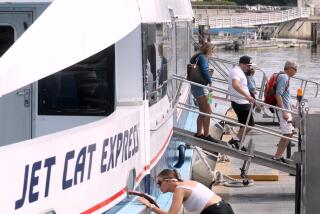2 Million in U.S. Told to Flee Ivan
- Share via
NEW ORLEANS — As the Caribbean cleaned up behind deadly Hurricane Ivan, nearly 2 million residents in four states were warned to flee to higher ground before the 140-mph storm hits the Gulf Coast.
The hurricane killed 68 people, tore thousands of homes apart and flooded vast areas as it swept through nine countries and the British territory of the Cayman Islands on its way into the Gulf of Mexico.
“This is going to set people back right through the Caribbean,” said Weston White, 35, a Jamaican whose seaside home was inundated by waves that sucked out furniture and left 3 feet of sand.
The damage elsewhere wasn’t ignored in the U.S. More than 1.2 million people in metropolitan New Orleans were warned to get out Tuesday as Ivan approached, threatening to submerge this below-sea-level city.
Residents streamed inland in bumper-to-bumper traffic in an agonizingly slow exodus. About three-quarters of a million more people along the coast in Florida, Mississippi and Alabama also were told to evacuate.
Forecasters said Ivan could reach 160 mph and strengthen to Category 5, the highest level, by the time it blows ashore as early as Thursday. It has repeatedly strengthened and weakened.
“Hopefully the house will still be here when we get back,” said Tara Chandra, who packed up his car and tried to book a Houston hotel room.
With hurricane-force wind extending 105 miles from its center, Ivan could cause significant damage wherever it strikes.
“I beg people on the coast: Do not ride this storm out,” Mississippi Gov. Haley Barbour said, urging people in other parts of the state to open their homes to relatives, friends and co-workers.
The National Hurricane Center in Miami posted a hurricane warning for about a 300-mile swath from Apalachicola in the Florida Panhandle to New Orleans and Grand Isle in Louisiana. Forecasters said Ivan could bring a coastal storm surge of 10 to 16 feet, topped by large, battering waves.
“If we get the kind of tidal surge they are saying, the fishing boats are all going to be in the trees,” said Jamee Lowry, owner of a bar and restaurant in Perdido Key, Fla., near the Alabama border.
New Orleans, the nation’s largest city below sea level, is particularly vulnerable to flooding.
More to Read
Sign up for Essential California
The most important California stories and recommendations in your inbox every morning.
You may occasionally receive promotional content from the Los Angeles Times.













